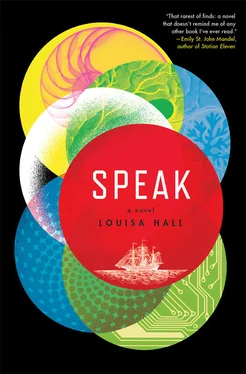And in the face of this lengthening distance, was it my job to follow you? To trail you to wherever you’d gone and bring you back by force or persuasion? I didn’t even know where you went. When you started insisting on giving MARY memory, I guessed you’d gone back to Europe. I might have been willing to follow you back there, but you gave me so few directions .
Still, maybe I should have tried harder. I do know certain facts. For instance, I know that you lived with your sister, your parents, and your grandfather. I know the small apartment you shared was on the second floor. Your family wasn’t wealthy, but you also weren’t poor. Your father was a pharmacist. When you and your sister were told to switch schools, and then when you were given a curfew, your parents must have been anxious, but they didn’t plan to emigrate. No one could have imagined what happened later, and anyway, your parents were busy providing. They made smaller, more reasonable changes. They cut down on expenditures and put more money away. They attempted to find scholarships for their daughters .
A year after I embarked on my journey, you won a place at a school in the north. According to a certificate I found once in your files while looking for your tax information, you had displayed great mathematical promise. While your sister stayed home, you went up north, where you lived with other talented children .
Does it anger you, Ruth, that I came across that certificate? I can imagine your eyes growing darker, narrowing as they do into daggers. What was I doing, rifling your files, looking for your W-2? Well, let me tell you something, Ruth. I feel I deserve a certificate of recognition, for respecting your secrets as much as I have .
From the early days of our marriage, I understood our differences. I came with my family; you came as an orphan. Based on such a fundamental division, I accepted your right to keep secrets. I know, for instance, about your sister’s diary in the top drawer of your desk. I saw it once, when I was looking for a sharp pencil, and while it hurt me to realize you’d kept it from me, that I’d never known about its existence, I didn’t even open it. Can you imagine such restraint? I only touched the leather cover, traced your sister’s initials with my pointer finger. And then I closed the drawer again and walked quickly out of your office .
I’ve respected your right to keep secrets, and what do I get in return for my efforts? The honor of witnessing your growing devotion to an idiotic computer. Maybe, when you visit her at night, you read her that diary. Maybe you’ve shared that secret with her, a secret you kept all the years of our marriage. Maybe that’s why you want to give her memory: so she can save your sister’s story, then call it up later as the answer to some innocent question .
I see why that might be appealing. As long as your sister’s still talking, she hasn’t fully ceased to exist. But what good are her words if they’re not comprehended? Sure, MARY will remember them, translated into binary signals. But is that understanding? Is that more understanding than I have? I’ve pieced a few things together, and what I don’t know I can imagine — something, by the way, our computer can’t manage. Faced with my own ignorance, I can imagine the facts .
For two years, after moving north, you must have been able to travel. You must have visited your family often. In your third year at the new school, as war was building and travel was forbidden, you stayed and wrote letters. Your sister wrote back .
In the fourth year of your separation, letters from your sister stopped. Alone at your school in the north, you continued to study. That winter, a wealthy alumnus arranged for the departure of the school’s Jewish students. You and eight of your talented schoolmates — the lucky ones, plucked away from your families — were smuggled out on a fishing boat. Huddled down below deck, you felt sick with good luck .
Once you were out of the country, your luck refused to run out. You won another scholarship, this time in Pennsylvania. They had a place for you, so you went, but by this point you were sleepwalking. What else could you do? You studied for a few weeks. You walked to your classes, passed tennis courts and baseball fields, sat beside boys with neat spiral notebooks. After three weeks, you left school to take a position at the Philadelphia Signal Depot. There were plenty of positions for women, since so many men were leaving to fight, and you wanted money to save for your family. You took a post as inspector in the office for telescope crystals. Your telescopes would be used by army meteorologists, in order to predict motions over the city you’d left. Your unit was adjacent to the one that trained pigeons. Often, while measuring crystals, you dreamed of freeing the birds from their cages .
You turned twenty. A young woman now, you didn’t think of falling in love. To do so would have been a distraction. In the attic apartment where you were living, you trained your mind to be a museum. You had to remember things right, so that when your family arrived, you could pick up where you left off. Instead of falling in love, you wrote letters. You sent them to the house where your family had lived, in case they somehow returned. You wrote letters to the authorities, to the associations for refugees. To the charities, the governments, the newspapers, waiting for some word from your family .
Oh, my barely slumbering wife. My wife who escaped on a fishing boat, who spent her twenties writing to no one. Maybe you’re right. Maybe I’m not equipped for such difficult stories .
Let me just climb in beside you. Let me drape my arm over your shoulder. There, Ruth. You and I. As it has been from the beginning. Or from a beginning, the one that I live by .
You have other allegiances. Even in sleep, I feel you preparing to leave. Not only to talk with that gabbing computer. Not only for secret dinners with my graduate students. No, there are longer journeys you’re preparing to take. I can tell by that look that scatters when I sneak up behind you. The look of someone already at sea, up in the crow’s nest, scanning for land. Who knows what plans you’ve already made? You’ve been packing your possessions for months .
(1) The Memoirs of Stephen R. Chinn: Chapter 2
Texas State Correctional Institution, Texarkana; August 2040
My particular youth wasn’t perfect, but it was my childhood nevertheless. Murray and I escaped the clutches of bullies and ran, in hysterics, down to his basement. We threw ourselves into bright chains of symbols. We made a universe in which we could live. We laughed at our little programming jokes. We were as happy as we were afraid.
It perhaps doesn’t need saying that I remained single through college. Though my youthful religion had faded, I still couldn’t escape my lone circling body. I spent my days at Harvard in the dim CRT glow of the science center computer lab, studiously avoiding all contact with members of the opposite sex. Murray Weeks, meanwhile, had gone off to Stanford, where he surprised me by finding a serious girlfriend. After that, he became a poor correspondent. I understood that he was in love and loathed him for having what I could not. The idea of embracing a woman seemed as unlikely as flying unaided through a dark hole. I tried a few times with poor results. These occasions confirmed my suspicions: unloved by a mother, lost to my father, and far from the one friendship I’d managed to make, I moved through the human world without catching. I kept company with computers.
Читать дальше












